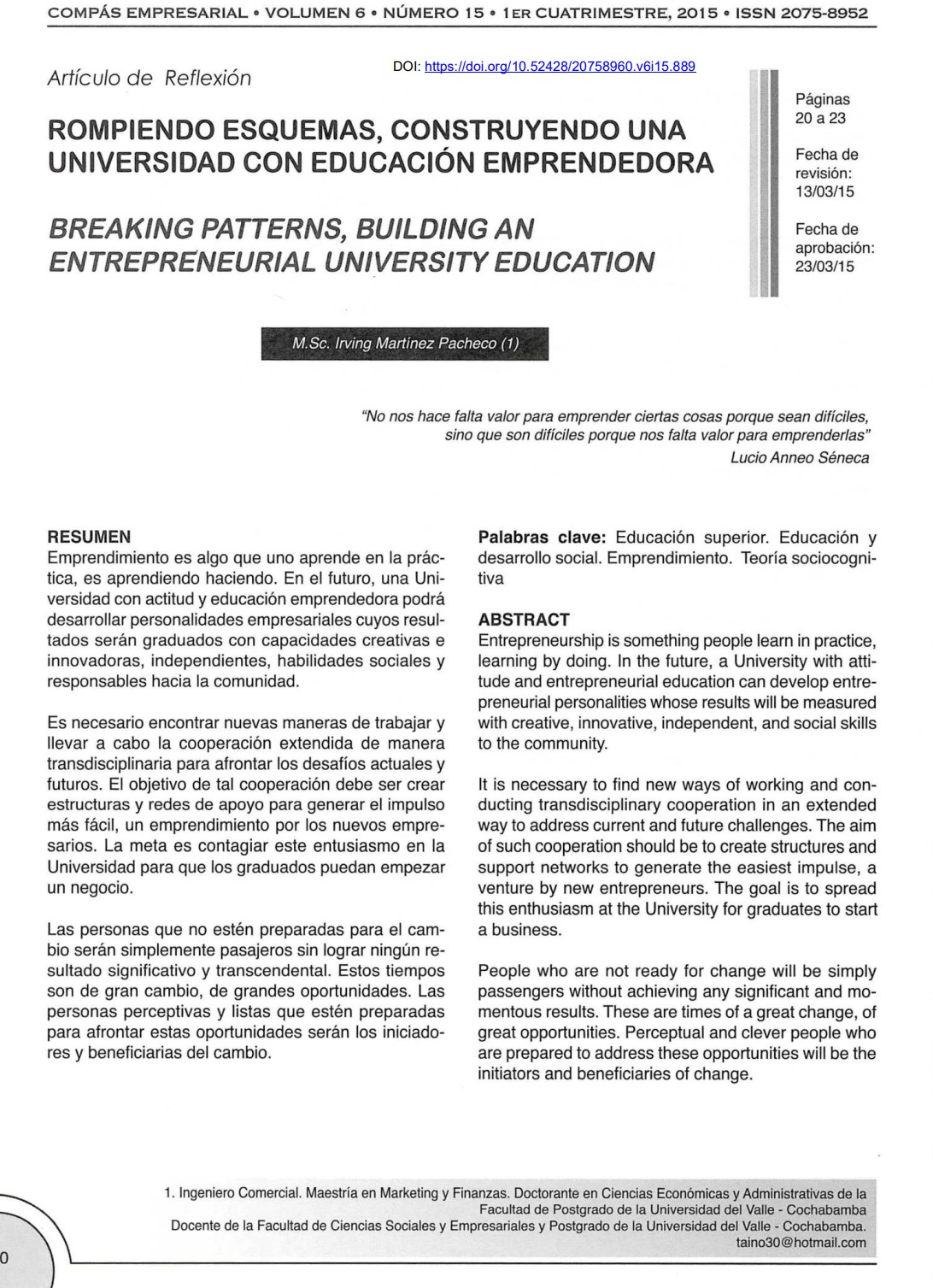Breaking Patterns, Building an Entrepreneurial University Education
DOI:
https://doi.org/10.52428/20758960.v6i15.889Keywords:
University education, Education and social development, Entrepreneurship, Cognitive theoryAbstract
Entrepreneurship is something people learn in practice, learning by doing. In the future, a University with attitude and entrepreneurial education can develop entrepreneurial personalities whose results will be measured with creative, innovative, independent, and social skills to the community. lt is necessary to find new ways of working and conducting transdisciplinary cooperation in an extended way to address current and future challenges. The aim of such cooperation should be to create structures and support networks to generate the easiest impulse, a venture by new entrepreneurs. The goal is to spread this enthusiasm at the University for graduates to start a business. People who are not ready for change will be simply passengers without achieving any significant and momentous results. These are times of a great change, of great opportunities. Perceptual and clever people who are prepared to address these opportunities will be the initiators and beneficiaries of change.
Downloads
References
(1) WEST 111 PAGE, GATEWOOD ELIZABETH. Hand book of Research in Entrepreneurship Education, US:Edward Elgar Publishing Limited (2009).
(2) VANS DE SIJDE PETER, RIDDER ANNEMARIE. Teaching Entrepreneurship. Germany: Physica Ver lag Heidelberg (2008). https://doi.org/10.1007/978-3-7908-2038-6
(3) BERKUN, S. The Myths of lnnovation. Sebastopol: O'Reily.(2007).
(4) PITTAWAY, L. Entrepreneurship Education: A Systematic Review of the Evidence. lnternational Small Business Journal, 25 (5): 479•510. (2005) https://doi.org/10.1177/0266242607080656
(5) FAYOLLE ALAIN, KYRO PAULA. The Dynamics between Entrepreneurship, Environment and Education, European Research in Entrepreneurship, UK: Edward Elgar Publishing Limited (2005).
(6) FAYOLLE ALAIN. Handbook of Research in Entrepreneurship Education, UK: Edward Elgar Publishing Limited (2007).
(7) PLATINER, H., MEINEL, C. Design thinking, Springer Heidelberg Dordrecht, London, (2012)
(8) VIANNA, M. VIANA, Y. Design thinking, MJV Press, Brazil (2012).
(9) KHRAMKOVA, E. Creativity Thinking or the Ability to Connect to What Is Outside the Box (2009).
(1 O) OSTERWALDER, A. Business Model Generation: A Handbook far Visionaries, Game Changers, and Challengers. Hoboken, NJ: Wiley. (2010).
(11) BLANK, S. The Four Steps to Epiphany. Success ful Strategies far Products that Win. CafePress.com. (2006).
(12) KIRBY, D. A. Entrepreneurship Education and lncubators: Pre•incubators, lncubators and Science Parks as Enterprise Laboratories. Trabajo presentado en la 14ta Annual lnt Ent Conference, Universidad de Nápoles Federico 11, Italia (2004).
(13) LEE. L. lnternational Handbook Entrepreneurship Education: A Compendium of Related lssues, Series on Entrepreneurship: The Life Cycle of Entrepreneurial Ventures, 3 (2): 79•105 (2007).
https://doi.org/10.1007/978-0-387-32313-8_4
(14) FAYOLLE ALAIN, KLANDT HEINZ. lnternational Entrepreneurship Education, UK: Edward Elgar Publishing Limited (2006). https://doi.org/10.4337/9781847201652

Downloads
Published
How to Cite
Issue
Section
License
Copyright (c) 2015 lrving Martínez Pacheco

This work is licensed under a Creative Commons Attribution 4.0 International License.
Authors who publish with this journal agree to the following terms:
- Authors retain copyright and grant the journal right of first publication with the work simultaneously licensed under a Creative Commons Attribution License 4.0 that allows others to share the work with an acknowledgement of the work's authorship and initial publication in this journal.
- Authors are able to enter into separate, additional contractual arrangements for the non-exclusive distribution of the journal's published version of the work (e.g., post it to an institutional repository or publish it in a book), with an acknowledgement of its initial publication in this journal.
- Authors are permitted and encouraged to post their work online (e.g., in institutional repositories or on their website) prior to and during the submission process, as it can lead to productive exchanges, as well as earlier and greater citation of published work.









